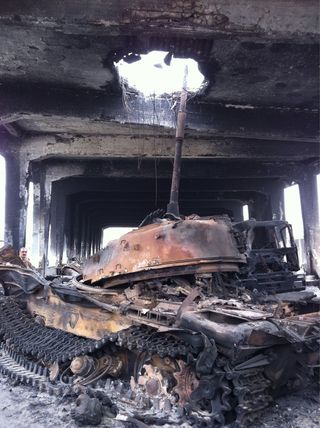 To state a seemingly obvious point, and one that requires no great revelatory insight or spark of genius to concoct, wars and other armed conflicts are unpredictable, lead to unintended consequences and usually exceed expected parameters in terms of duration, cost and scope. Make this rather pedestrian observation aloud in informed company, however, and expect to be met with rolled eyes and the gentle pats of condescending assurance: "Yes, yes, everybody knows this already."
To state a seemingly obvious point, and one that requires no great revelatory insight or spark of genius to concoct, wars and other armed conflicts are unpredictable, lead to unintended consequences and usually exceed expected parameters in terms of duration, cost and scope. Make this rather pedestrian observation aloud in informed company, however, and expect to be met with rolled eyes and the gentle pats of condescending assurance: "Yes, yes, everybody knows this already."
Yet this truism has reached that bizarre stage of being so widely known, so accepted, so hum-drum as to be frequently disregarded when making policy - particularly, policy that involves the initiation of (or intervention in) armed conflict.
The NATO intervention in Libya is only the most recent example. This exchange between Elliot Abrams and Micah Zenko provides an instance of the unbridled optimism that pervaded the pro-intervention camp. Abrams, who was by no means the most effusive pollyana, prescribed the following:
So how do we achieve that goal of getting Qaddafi out? We use a combination of means, which may include UN resolutions, Arab League and other Arab and Muslim actions, sanctions, freezes of his oil income, recognition of an alternative government, meetings with opposition leaders, broadcasting against the regime, and on to more forceful actions. These could include arming the opposition and/or preventing Qaddafi from using the military strength he retains to win this civil war. Preventing him from using air power is a possible part of the mix, and that might be achieved from NATO air bases in Italy or ships in the Mediterranean.
Such steps would constitute military intervention despite the fact that no American or NATO soldier would set foot in Libya. [emphasis added]
Despite what everybody knows is the unwieldy, unruly, unpredictable nature of armed conflict (and with what are certainly superfluous daily reminders emanating from Iraq and Afghanistan), proponents of intervention were unabashed in their rosy predictions. They were almost entirely remiss in acknowledging the possibility, nay likelihood, that this effort would morph into something much larger, more time consuming, more expensive than advertised, and take on other unknown, and unwanted, permutations.
Predictably, things aren't going as planned (they rarely do, but you knew that already). A campaign that was slated to last "days not weeks" has entered its third month, with no end to Qaddafi's regime in sight (Note: the Libya mission has already exceeded the duration of NATO's operations in Kosovo).
While the imposition of the No-Fly-Zone by NATO forces completely neutralized the Libyan regime's airpower (limited as it was), stagnation on the battlefield has led NATO to shift tactics. NATO is now targeting regime leaders, as well as military equipment and assets, with greater frequency. However, these looser rules of engagement are in possible violation of the UNSC resolution under whose imprimatur the mission is being carried out. Apparently, the utility of that authorization didn't survive long past first contact with the enemy.
In addition, Great Britain and France have begun deploying attack helicopters in theater, a weapons platform that allows for more precision targetting and, more importantly, eases the burden on each nation's rapidly dwindling stockpiles of JDAMs. These nations were amongst the most vocal proponents of military intervention, but their capacity to engage in any type of protracted conflict using these guided munitions was extremely limited.
It's almost as if they assumed that this war would be neat, by-the-book and short, and made policy based on those expectations despite war's notoriously uncooperative nature. Daniel Byman and Matthew Waxman had an interesting piece in Foreign Policy a couple of weeks back that discusses, in greater detail, some of the reasons why these types of conflicts tend to drag on and lead to unsatisfying outcomes.
But if everybody knows that armed conflicts exhibit these tendencies generally speaking, shouldn't the presumption tilt heavily against those that forecast a cakewalk - even absent the specifics provided by the likes of Byman and Waxman?
To be clear, Qaddafi could be ousted tomorrow. However, the next phase of the conflict could be even more taxing on participating NATO members. Despite the fraught nature of the post-Qaddafi aftermath, there don't seem to be clearly thought out plans for which organizations and groups (rebel and foreign) will be participating in that transition period and under what rules.
But who needs contingency plans to cover various less-than-ideal possible outcomes? These things tend to sort themselves out, right?
(Photo Credit: Ben Wedeman, CNN)
So over the Atlantic I'm beating the isolationist drum again . . . and when I saw beating the drum I mean pointing out that charges of incipient isolationism are a giant canard:

